The Historical Evolution of Management Theory and Modern Practice
VerifiedAdded on 2023/06/14
|10
|2611
|498
Essay
AI Summary
This essay explores the evolution of management theory and practice, tracing its origins from Frederick Winslow Taylor's scientific management to the post-industrial era and beyond. It discusses the impact of the industrial revolutions on management practices, highlighting the shift from mechanistic ideologies to a focus on employee motivation and engagement. The essay also examines the role of managers in creating a positive work environment and setting goals for the future, emphasizing the importance of understanding human skills and abilities to drive organizational success. The document is available on Desklib, a platform offering a wide range of study resources for students.
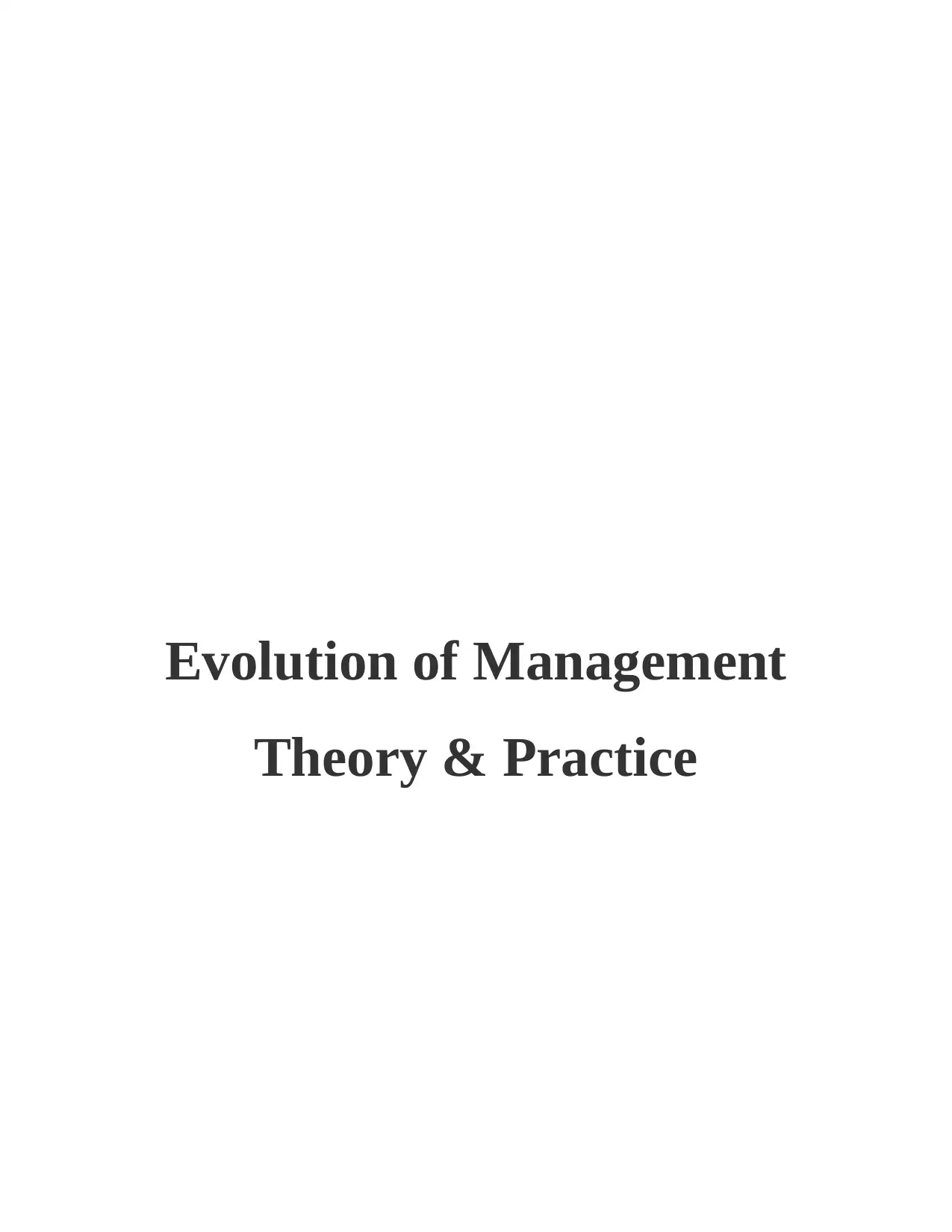
Evolution of Management
Theory & Practice
Theory & Practice
Paraphrase This Document
Need a fresh take? Get an instant paraphrase of this document with our AI Paraphraser

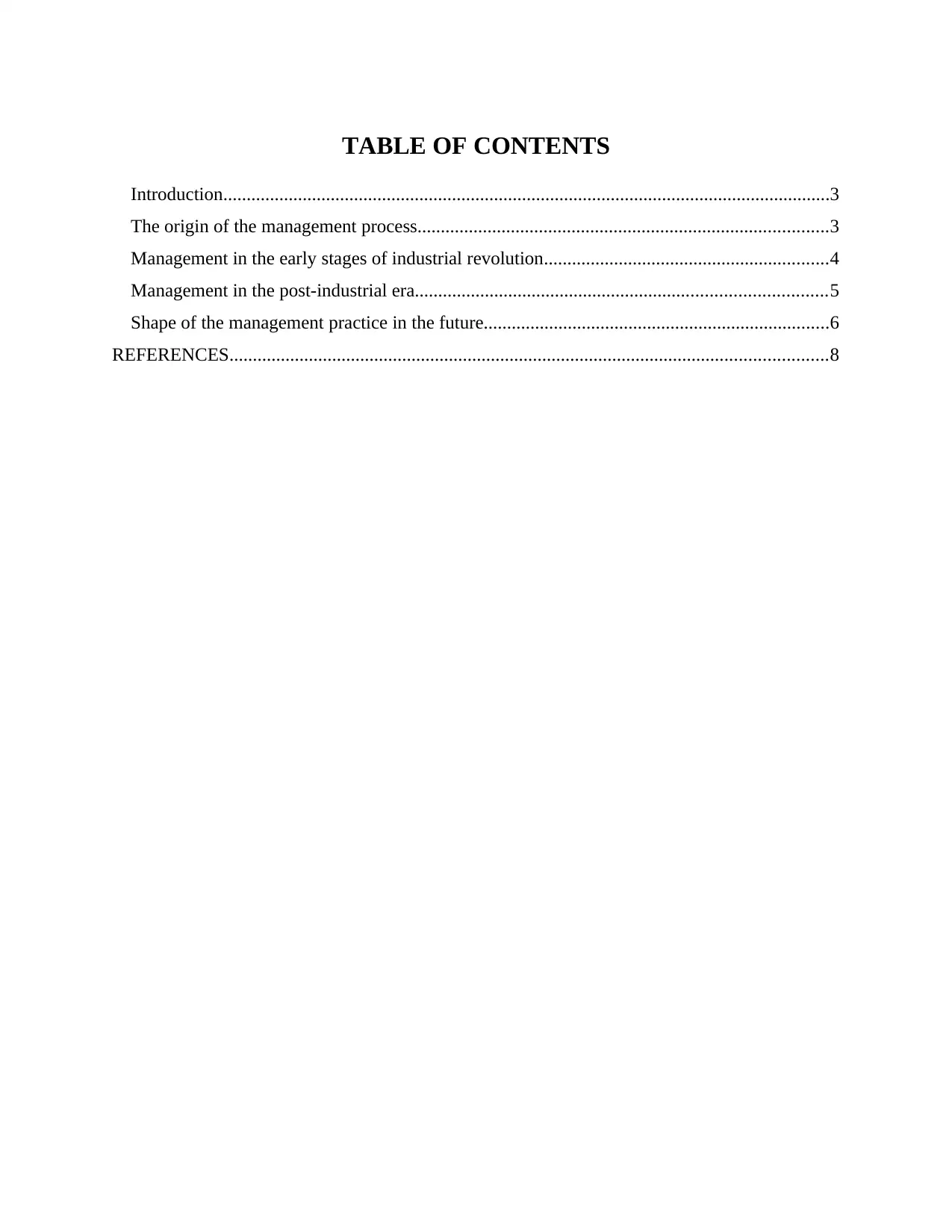
TABLE OF CONTENTS
Introduction..................................................................................................................................3
The origin of the management process........................................................................................3
Management in the early stages of industrial revolution.............................................................4
Management in the post-industrial era........................................................................................5
Shape of the management practice in the future..........................................................................6
REFERENCES................................................................................................................................8
Introduction..................................................................................................................................3
The origin of the management process........................................................................................3
Management in the early stages of industrial revolution.............................................................4
Management in the post-industrial era........................................................................................5
Shape of the management practice in the future..........................................................................6
REFERENCES................................................................................................................................8
⊘ This is a preview!⊘
Do you want full access?
Subscribe today to unlock all pages.

Trusted by 1+ million students worldwide
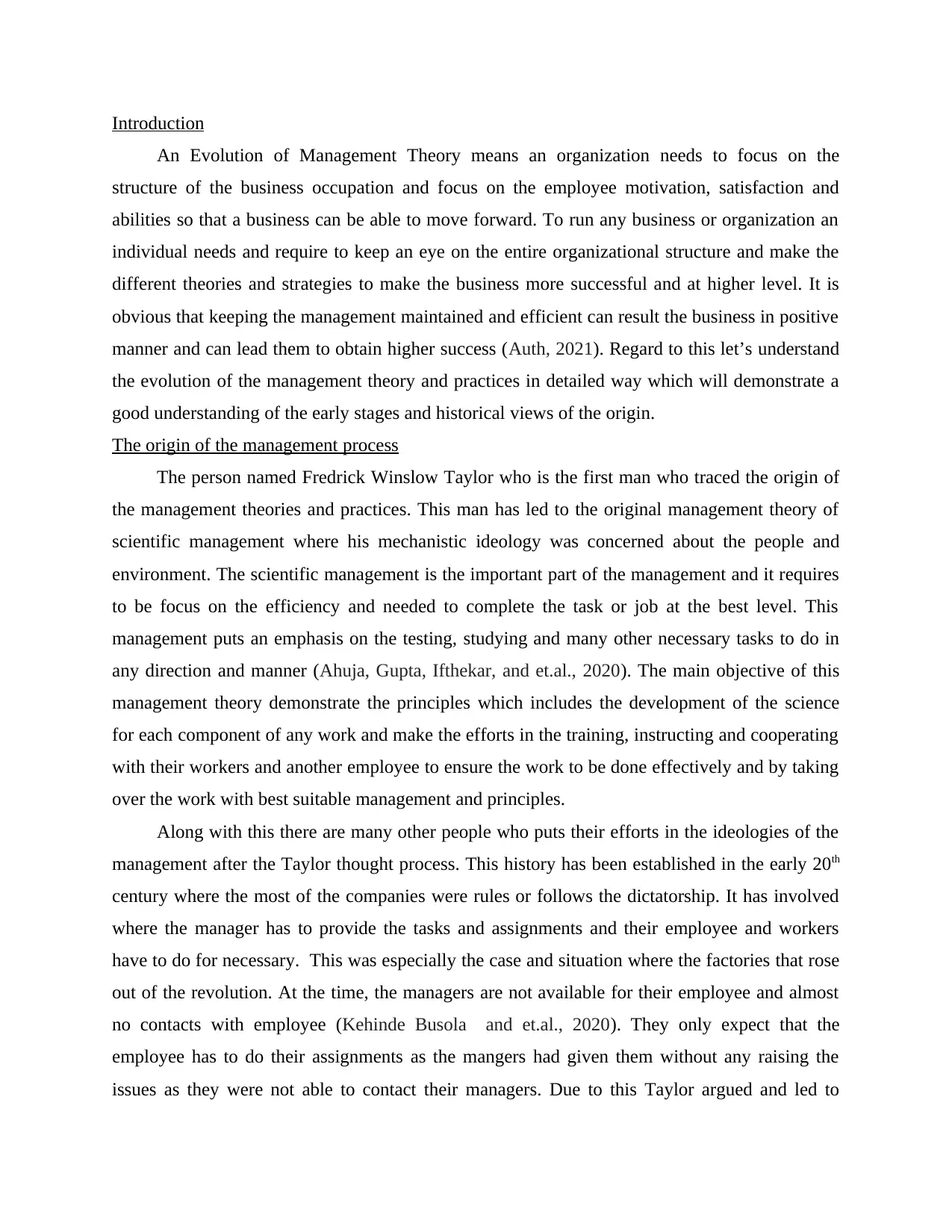
Introduction
An Evolution of Management Theory means an organization needs to focus on the
structure of the business occupation and focus on the employee motivation, satisfaction and
abilities so that a business can be able to move forward. To run any business or organization an
individual needs and require to keep an eye on the entire organizational structure and make the
different theories and strategies to make the business more successful and at higher level. It is
obvious that keeping the management maintained and efficient can result the business in positive
manner and can lead them to obtain higher success (Auth, 2021). Regard to this let’s understand
the evolution of the management theory and practices in detailed way which will demonstrate a
good understanding of the early stages and historical views of the origin.
The origin of the management process
The person named Fredrick Winslow Taylor who is the first man who traced the origin of
the management theories and practices. This man has led to the original management theory of
scientific management where his mechanistic ideology was concerned about the people and
environment. The scientific management is the important part of the management and it requires
to be focus on the efficiency and needed to complete the task or job at the best level. This
management puts an emphasis on the testing, studying and many other necessary tasks to do in
any direction and manner (Ahuja, Gupta, Ifthekar, and et.al., 2020). The main objective of this
management theory demonstrate the principles which includes the development of the science
for each component of any work and make the efforts in the training, instructing and cooperating
with their workers and another employee to ensure the work to be done effectively and by taking
over the work with best suitable management and principles.
Along with this there are many other people who puts their efforts in the ideologies of the
management after the Taylor thought process. This history has been established in the early 20th
century where the most of the companies were rules or follows the dictatorship. It has involved
where the manager has to provide the tasks and assignments and their employee and workers
have to do for necessary. This was especially the case and situation where the factories that rose
out of the revolution. At the time, the managers are not available for their employee and almost
no contacts with employee (Kehinde Busola and et.al., 2020). They only expect that the
employee has to do their assignments as the mangers had given them without any raising the
issues as they were not able to contact their managers. Due to this Taylor argued and led to
An Evolution of Management Theory means an organization needs to focus on the
structure of the business occupation and focus on the employee motivation, satisfaction and
abilities so that a business can be able to move forward. To run any business or organization an
individual needs and require to keep an eye on the entire organizational structure and make the
different theories and strategies to make the business more successful and at higher level. It is
obvious that keeping the management maintained and efficient can result the business in positive
manner and can lead them to obtain higher success (Auth, 2021). Regard to this let’s understand
the evolution of the management theory and practices in detailed way which will demonstrate a
good understanding of the early stages and historical views of the origin.
The origin of the management process
The person named Fredrick Winslow Taylor who is the first man who traced the origin of
the management theories and practices. This man has led to the original management theory of
scientific management where his mechanistic ideology was concerned about the people and
environment. The scientific management is the important part of the management and it requires
to be focus on the efficiency and needed to complete the task or job at the best level. This
management puts an emphasis on the testing, studying and many other necessary tasks to do in
any direction and manner (Ahuja, Gupta, Ifthekar, and et.al., 2020). The main objective of this
management theory demonstrate the principles which includes the development of the science
for each component of any work and make the efforts in the training, instructing and cooperating
with their workers and another employee to ensure the work to be done effectively and by taking
over the work with best suitable management and principles.
Along with this there are many other people who puts their efforts in the ideologies of the
management after the Taylor thought process. This history has been established in the early 20th
century where the most of the companies were rules or follows the dictatorship. It has involved
where the manager has to provide the tasks and assignments and their employee and workers
have to do for necessary. This was especially the case and situation where the factories that rose
out of the revolution. At the time, the managers are not available for their employee and almost
no contacts with employee (Kehinde Busola and et.al., 2020). They only expect that the
employee has to do their assignments as the mangers had given them without any raising the
issues as they were not able to contact their managers. Due to this Taylor argued and led to
Paraphrase This Document
Need a fresh take? Get an instant paraphrase of this document with our AI Paraphraser
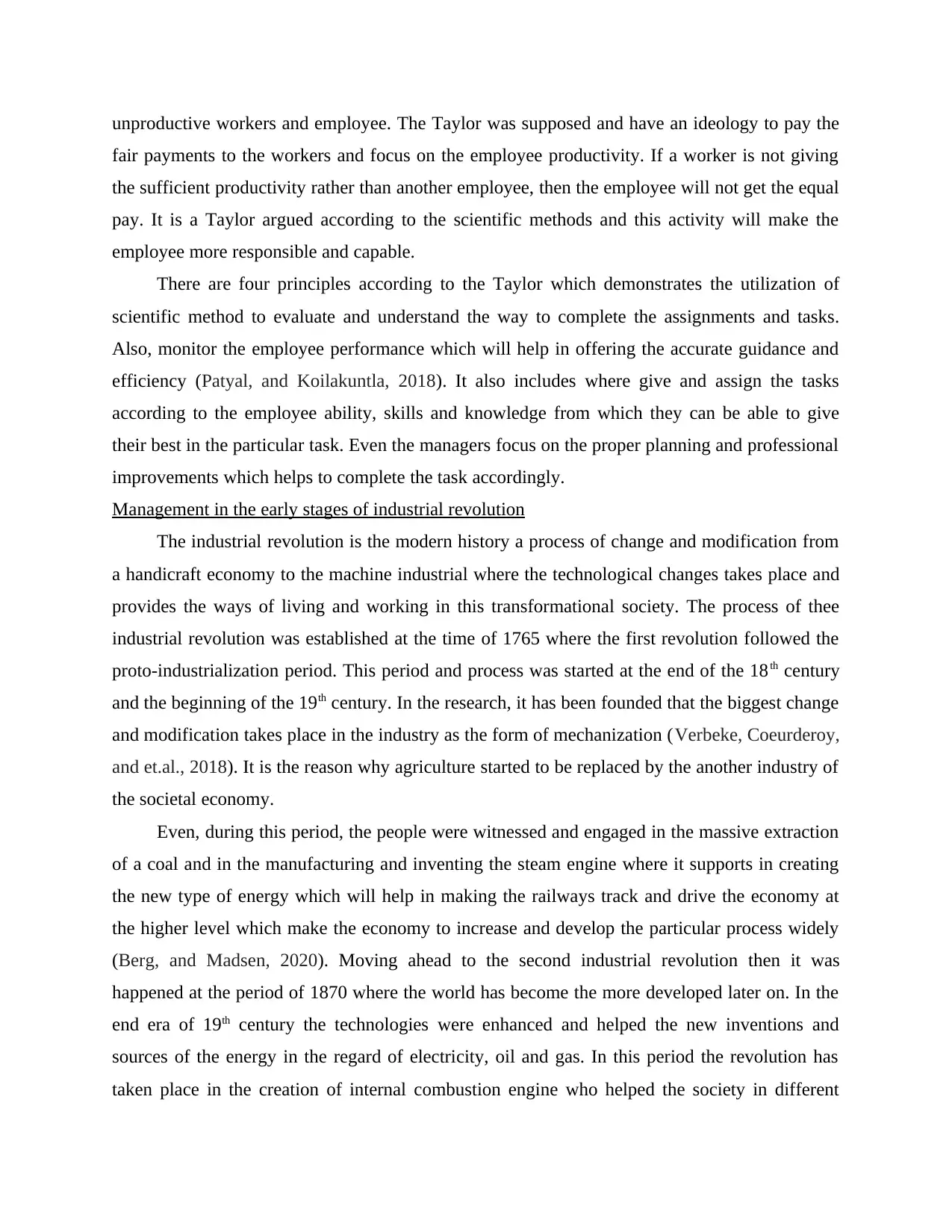
unproductive workers and employee. The Taylor was supposed and have an ideology to pay the
fair payments to the workers and focus on the employee productivity. If a worker is not giving
the sufficient productivity rather than another employee, then the employee will not get the equal
pay. It is a Taylor argued according to the scientific methods and this activity will make the
employee more responsible and capable.
There are four principles according to the Taylor which demonstrates the utilization of
scientific method to evaluate and understand the way to complete the assignments and tasks.
Also, monitor the employee performance which will help in offering the accurate guidance and
efficiency (Patyal, and Koilakuntla, 2018). It also includes where give and assign the tasks
according to the employee ability, skills and knowledge from which they can be able to give
their best in the particular task. Even the managers focus on the proper planning and professional
improvements which helps to complete the task accordingly.
Management in the early stages of industrial revolution
The industrial revolution is the modern history a process of change and modification from
a handicraft economy to the machine industrial where the technological changes takes place and
provides the ways of living and working in this transformational society. The process of thee
industrial revolution was established at the time of 1765 where the first revolution followed the
proto-industrialization period. This period and process was started at the end of the 18th century
and the beginning of the 19th century. In the research, it has been founded that the biggest change
and modification takes place in the industry as the form of mechanization (Verbeke, Coeurderoy,
and et.al., 2018). It is the reason why agriculture started to be replaced by the another industry of
the societal economy.
Even, during this period, the people were witnessed and engaged in the massive extraction
of a coal and in the manufacturing and inventing the steam engine where it supports in creating
the new type of energy which will help in making the railways track and drive the economy at
the higher level which make the economy to increase and develop the particular process widely
(Berg, and Madsen, 2020). Moving ahead to the second industrial revolution then it was
happened at the period of 1870 where the world has become the more developed later on. In the
end era of 19th century the technologies were enhanced and helped the new inventions and
sources of the energy in the regard of electricity, oil and gas. In this period the revolution has
taken place in the creation of internal combustion engine who helped the society in different
fair payments to the workers and focus on the employee productivity. If a worker is not giving
the sufficient productivity rather than another employee, then the employee will not get the equal
pay. It is a Taylor argued according to the scientific methods and this activity will make the
employee more responsible and capable.
There are four principles according to the Taylor which demonstrates the utilization of
scientific method to evaluate and understand the way to complete the assignments and tasks.
Also, monitor the employee performance which will help in offering the accurate guidance and
efficiency (Patyal, and Koilakuntla, 2018). It also includes where give and assign the tasks
according to the employee ability, skills and knowledge from which they can be able to give
their best in the particular task. Even the managers focus on the proper planning and professional
improvements which helps to complete the task accordingly.
Management in the early stages of industrial revolution
The industrial revolution is the modern history a process of change and modification from
a handicraft economy to the machine industrial where the technological changes takes place and
provides the ways of living and working in this transformational society. The process of thee
industrial revolution was established at the time of 1765 where the first revolution followed the
proto-industrialization period. This period and process was started at the end of the 18th century
and the beginning of the 19th century. In the research, it has been founded that the biggest change
and modification takes place in the industry as the form of mechanization (Verbeke, Coeurderoy,
and et.al., 2018). It is the reason why agriculture started to be replaced by the another industry of
the societal economy.
Even, during this period, the people were witnessed and engaged in the massive extraction
of a coal and in the manufacturing and inventing the steam engine where it supports in creating
the new type of energy which will help in making the railways track and drive the economy at
the higher level which make the economy to increase and develop the particular process widely
(Berg, and Madsen, 2020). Moving ahead to the second industrial revolution then it was
happened at the period of 1870 where the world has become the more developed later on. In the
end era of 19th century the technologies were enhanced and helped the new inventions and
sources of the energy in the regard of electricity, oil and gas. In this period the revolution has
taken place in the creation of internal combustion engine who helped the society in different
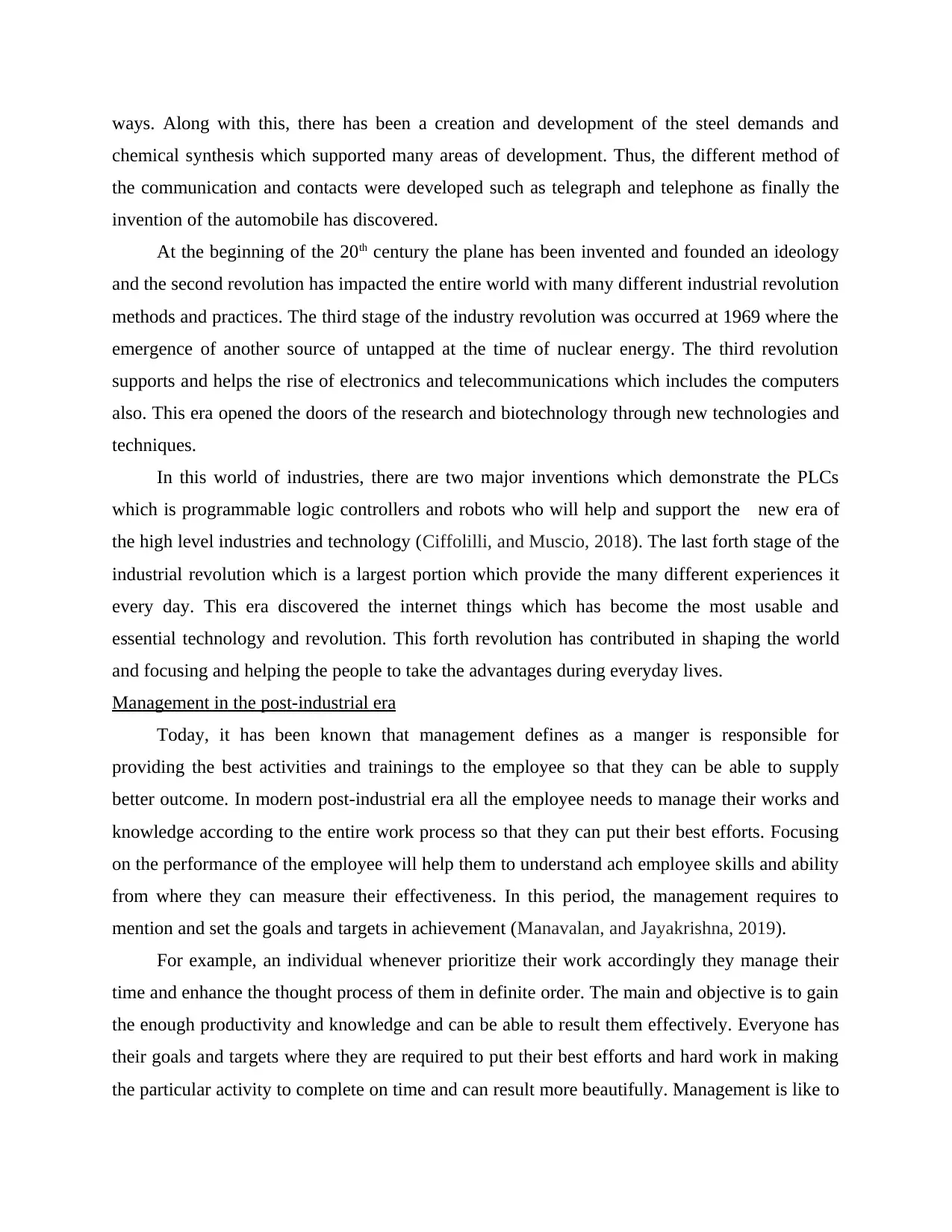
ways. Along with this, there has been a creation and development of the steel demands and
chemical synthesis which supported many areas of development. Thus, the different method of
the communication and contacts were developed such as telegraph and telephone as finally the
invention of the automobile has discovered.
At the beginning of the 20th century the plane has been invented and founded an ideology
and the second revolution has impacted the entire world with many different industrial revolution
methods and practices. The third stage of the industry revolution was occurred at 1969 where the
emergence of another source of untapped at the time of nuclear energy. The third revolution
supports and helps the rise of electronics and telecommunications which includes the computers
also. This era opened the doors of the research and biotechnology through new technologies and
techniques.
In this world of industries, there are two major inventions which demonstrate the PLCs
which is programmable logic controllers and robots who will help and support the new era of
the high level industries and technology (Ciffolilli, and Muscio, 2018). The last forth stage of the
industrial revolution which is a largest portion which provide the many different experiences it
every day. This era discovered the internet things which has become the most usable and
essential technology and revolution. This forth revolution has contributed in shaping the world
and focusing and helping the people to take the advantages during everyday lives.
Management in the post-industrial era
Today, it has been known that management defines as a manger is responsible for
providing the best activities and trainings to the employee so that they can be able to supply
better outcome. In modern post-industrial era all the employee needs to manage their works and
knowledge according to the entire work process so that they can put their best efforts. Focusing
on the performance of the employee will help them to understand ach employee skills and ability
from where they can measure their effectiveness. In this period, the management requires to
mention and set the goals and targets in achievement (Manavalan, and Jayakrishna, 2019).
For example, an individual whenever prioritize their work accordingly they manage their
time and enhance the thought process of them in definite order. The main and objective is to gain
the enough productivity and knowledge and can be able to result them effectively. Everyone has
their goals and targets where they are required to put their best efforts and hard work in making
the particular activity to complete on time and can result more beautifully. Management is like to
chemical synthesis which supported many areas of development. Thus, the different method of
the communication and contacts were developed such as telegraph and telephone as finally the
invention of the automobile has discovered.
At the beginning of the 20th century the plane has been invented and founded an ideology
and the second revolution has impacted the entire world with many different industrial revolution
methods and practices. The third stage of the industry revolution was occurred at 1969 where the
emergence of another source of untapped at the time of nuclear energy. The third revolution
supports and helps the rise of electronics and telecommunications which includes the computers
also. This era opened the doors of the research and biotechnology through new technologies and
techniques.
In this world of industries, there are two major inventions which demonstrate the PLCs
which is programmable logic controllers and robots who will help and support the new era of
the high level industries and technology (Ciffolilli, and Muscio, 2018). The last forth stage of the
industrial revolution which is a largest portion which provide the many different experiences it
every day. This era discovered the internet things which has become the most usable and
essential technology and revolution. This forth revolution has contributed in shaping the world
and focusing and helping the people to take the advantages during everyday lives.
Management in the post-industrial era
Today, it has been known that management defines as a manger is responsible for
providing the best activities and trainings to the employee so that they can be able to supply
better outcome. In modern post-industrial era all the employee needs to manage their works and
knowledge according to the entire work process so that they can put their best efforts. Focusing
on the performance of the employee will help them to understand ach employee skills and ability
from where they can measure their effectiveness. In this period, the management requires to
mention and set the goals and targets in achievement (Manavalan, and Jayakrishna, 2019).
For example, an individual whenever prioritize their work accordingly they manage their
time and enhance the thought process of them in definite order. The main and objective is to gain
the enough productivity and knowledge and can be able to result them effectively. Everyone has
their goals and targets where they are required to put their best efforts and hard work in making
the particular activity to complete on time and can result more beautifully. Management is like to
⊘ This is a preview!⊘
Do you want full access?
Subscribe today to unlock all pages.

Trusted by 1+ million students worldwide
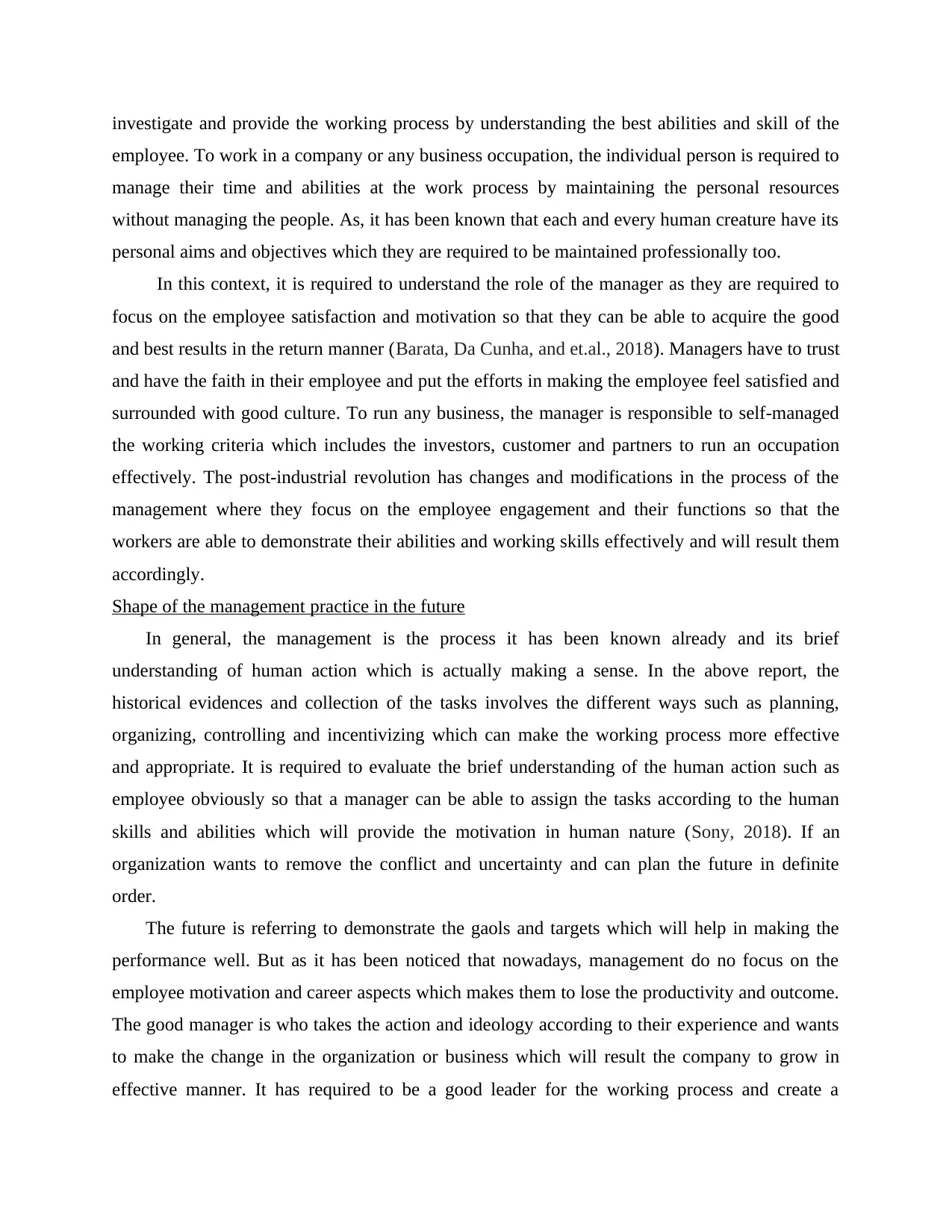
investigate and provide the working process by understanding the best abilities and skill of the
employee. To work in a company or any business occupation, the individual person is required to
manage their time and abilities at the work process by maintaining the personal resources
without managing the people. As, it has been known that each and every human creature have its
personal aims and objectives which they are required to be maintained professionally too.
In this context, it is required to understand the role of the manager as they are required to
focus on the employee satisfaction and motivation so that they can be able to acquire the good
and best results in the return manner (Barata, Da Cunha, and et.al., 2018). Managers have to trust
and have the faith in their employee and put the efforts in making the employee feel satisfied and
surrounded with good culture. To run any business, the manager is responsible to self-managed
the working criteria which includes the investors, customer and partners to run an occupation
effectively. The post-industrial revolution has changes and modifications in the process of the
management where they focus on the employee engagement and their functions so that the
workers are able to demonstrate their abilities and working skills effectively and will result them
accordingly.
Shape of the management practice in the future
In general, the management is the process it has been known already and its brief
understanding of human action which is actually making a sense. In the above report, the
historical evidences and collection of the tasks involves the different ways such as planning,
organizing, controlling and incentivizing which can make the working process more effective
and appropriate. It is required to evaluate the brief understanding of the human action such as
employee obviously so that a manager can be able to assign the tasks according to the human
skills and abilities which will provide the motivation in human nature (Sony, 2018). If an
organization wants to remove the conflict and uncertainty and can plan the future in definite
order.
The future is referring to demonstrate the gaols and targets which will help in making the
performance well. But as it has been noticed that nowadays, management do no focus on the
employee motivation and career aspects which makes them to lose the productivity and outcome.
The good manager is who takes the action and ideology according to their experience and wants
to make the change in the organization or business which will result the company to grow in
effective manner. It has required to be a good leader for the working process and create a
employee. To work in a company or any business occupation, the individual person is required to
manage their time and abilities at the work process by maintaining the personal resources
without managing the people. As, it has been known that each and every human creature have its
personal aims and objectives which they are required to be maintained professionally too.
In this context, it is required to understand the role of the manager as they are required to
focus on the employee satisfaction and motivation so that they can be able to acquire the good
and best results in the return manner (Barata, Da Cunha, and et.al., 2018). Managers have to trust
and have the faith in their employee and put the efforts in making the employee feel satisfied and
surrounded with good culture. To run any business, the manager is responsible to self-managed
the working criteria which includes the investors, customer and partners to run an occupation
effectively. The post-industrial revolution has changes and modifications in the process of the
management where they focus on the employee engagement and their functions so that the
workers are able to demonstrate their abilities and working skills effectively and will result them
accordingly.
Shape of the management practice in the future
In general, the management is the process it has been known already and its brief
understanding of human action which is actually making a sense. In the above report, the
historical evidences and collection of the tasks involves the different ways such as planning,
organizing, controlling and incentivizing which can make the working process more effective
and appropriate. It is required to evaluate the brief understanding of the human action such as
employee obviously so that a manager can be able to assign the tasks according to the human
skills and abilities which will provide the motivation in human nature (Sony, 2018). If an
organization wants to remove the conflict and uncertainty and can plan the future in definite
order.
The future is referring to demonstrate the gaols and targets which will help in making the
performance well. But as it has been noticed that nowadays, management do no focus on the
employee motivation and career aspects which makes them to lose the productivity and outcome.
The good manager is who takes the action and ideology according to their experience and wants
to make the change in the organization or business which will result the company to grow in
effective manner. It has required to be a good leader for the working process and create a
Paraphrase This Document
Need a fresh take? Get an instant paraphrase of this document with our AI Paraphraser
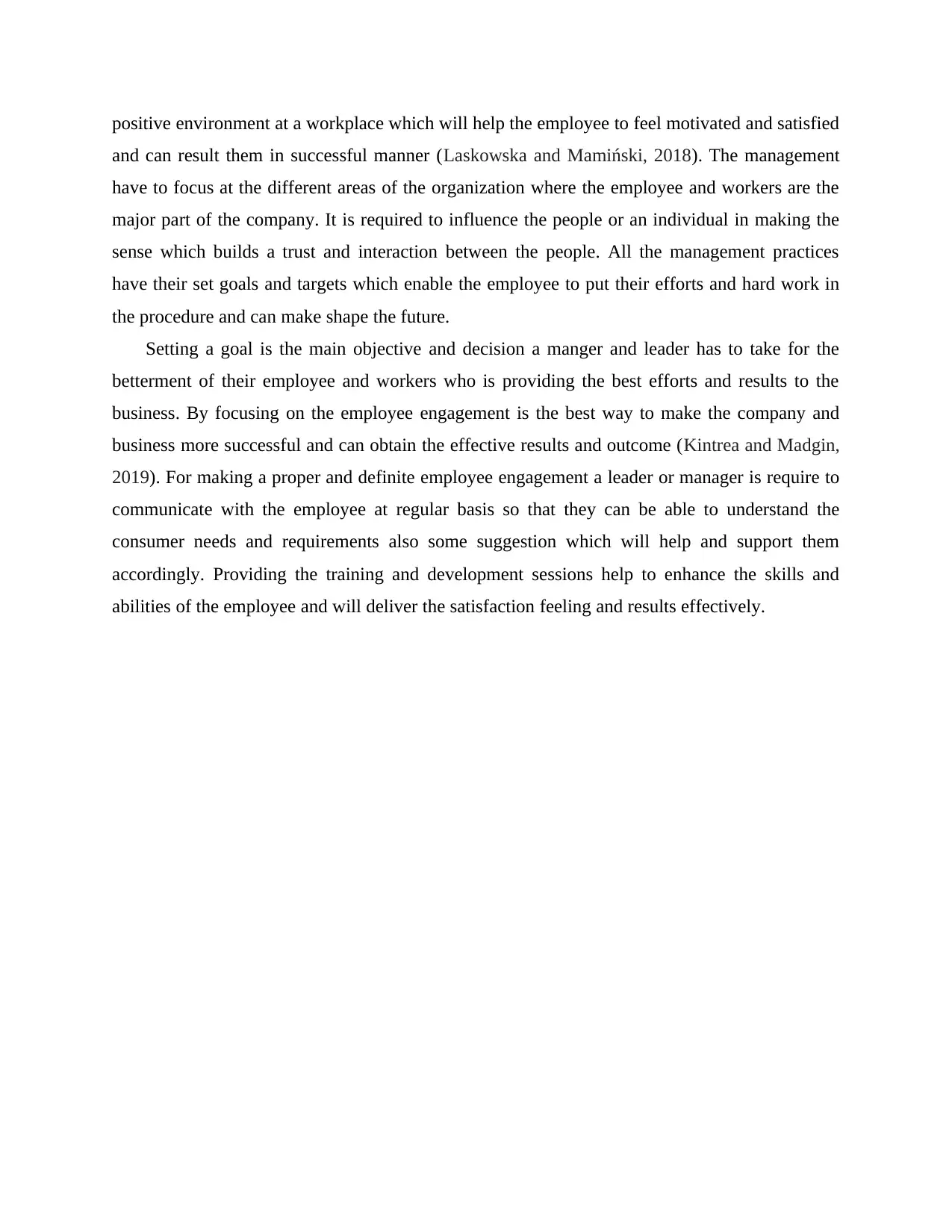
positive environment at a workplace which will help the employee to feel motivated and satisfied
and can result them in successful manner (Laskowska and Mamiński, 2018). The management
have to focus at the different areas of the organization where the employee and workers are the
major part of the company. It is required to influence the people or an individual in making the
sense which builds a trust and interaction between the people. All the management practices
have their set goals and targets which enable the employee to put their efforts and hard work in
the procedure and can make shape the future.
Setting a goal is the main objective and decision a manger and leader has to take for the
betterment of their employee and workers who is providing the best efforts and results to the
business. By focusing on the employee engagement is the best way to make the company and
business more successful and can obtain the effective results and outcome (Kintrea and Madgin,
2019). For making a proper and definite employee engagement a leader or manager is require to
communicate with the employee at regular basis so that they can be able to understand the
consumer needs and requirements also some suggestion which will help and support them
accordingly. Providing the training and development sessions help to enhance the skills and
abilities of the employee and will deliver the satisfaction feeling and results effectively.
and can result them in successful manner (Laskowska and Mamiński, 2018). The management
have to focus at the different areas of the organization where the employee and workers are the
major part of the company. It is required to influence the people or an individual in making the
sense which builds a trust and interaction between the people. All the management practices
have their set goals and targets which enable the employee to put their efforts and hard work in
the procedure and can make shape the future.
Setting a goal is the main objective and decision a manger and leader has to take for the
betterment of their employee and workers who is providing the best efforts and results to the
business. By focusing on the employee engagement is the best way to make the company and
business more successful and can obtain the effective results and outcome (Kintrea and Madgin,
2019). For making a proper and definite employee engagement a leader or manager is require to
communicate with the employee at regular basis so that they can be able to understand the
consumer needs and requirements also some suggestion which will help and support them
accordingly. Providing the training and development sessions help to enhance the skills and
abilities of the employee and will deliver the satisfaction feeling and results effectively.
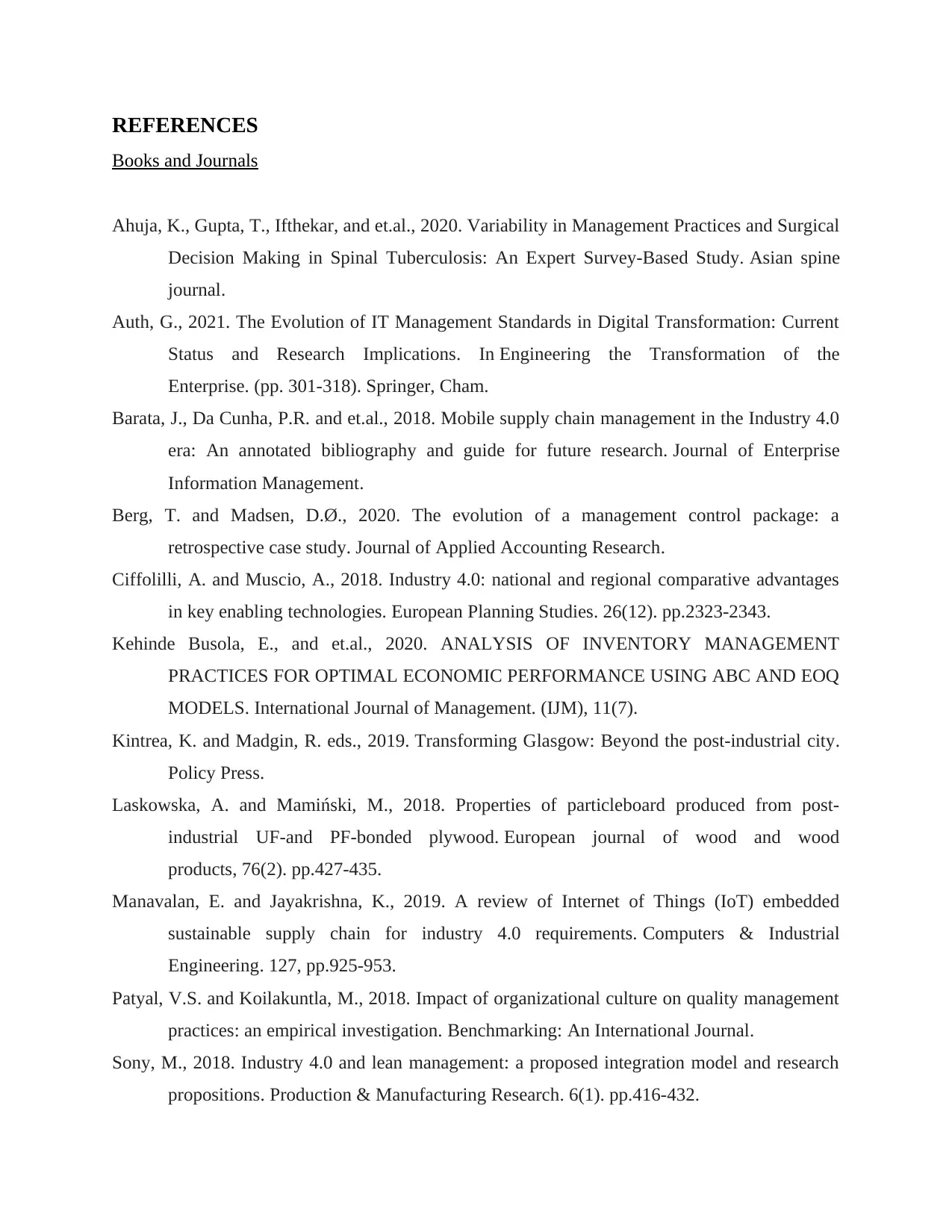
REFERENCES
Books and Journals
Ahuja, K., Gupta, T., Ifthekar, and et.al., 2020. Variability in Management Practices and Surgical
Decision Making in Spinal Tuberculosis: An Expert Survey-Based Study. Asian spine
journal.
Auth, G., 2021. The Evolution of IT Management Standards in Digital Transformation: Current
Status and Research Implications. In Engineering the Transformation of the
Enterprise. (pp. 301-318). Springer, Cham.
Barata, J., Da Cunha, P.R. and et.al., 2018. Mobile supply chain management in the Industry 4.0
era: An annotated bibliography and guide for future research. Journal of Enterprise
Information Management.
Berg, T. and Madsen, D.Ø., 2020. The evolution of a management control package: a
retrospective case study. Journal of Applied Accounting Research.
Ciffolilli, A. and Muscio, A., 2018. Industry 4.0: national and regional comparative advantages
in key enabling technologies. European Planning Studies. 26(12). pp.2323-2343.
Kehinde Busola, E., and et.al., 2020. ANALYSIS OF INVENTORY MANAGEMENT
PRACTICES FOR OPTIMAL ECONOMIC PERFORMANCE USING ABC AND EOQ
MODELS. International Journal of Management. (IJM), 11(7).
Kintrea, K. and Madgin, R. eds., 2019. Transforming Glasgow: Beyond the post-industrial city.
Policy Press.
Laskowska, A. and Mamiński, M., 2018. Properties of particleboard produced from post-
industrial UF-and PF-bonded plywood. European journal of wood and wood
products, 76(2). pp.427-435.
Manavalan, E. and Jayakrishna, K., 2019. A review of Internet of Things (IoT) embedded
sustainable supply chain for industry 4.0 requirements. Computers & Industrial
Engineering. 127, pp.925-953.
Patyal, V.S. and Koilakuntla, M., 2018. Impact of organizational culture on quality management
practices: an empirical investigation. Benchmarking: An International Journal.
Sony, M., 2018. Industry 4.0 and lean management: a proposed integration model and research
propositions. Production & Manufacturing Research. 6(1). pp.416-432.
Books and Journals
Ahuja, K., Gupta, T., Ifthekar, and et.al., 2020. Variability in Management Practices and Surgical
Decision Making in Spinal Tuberculosis: An Expert Survey-Based Study. Asian spine
journal.
Auth, G., 2021. The Evolution of IT Management Standards in Digital Transformation: Current
Status and Research Implications. In Engineering the Transformation of the
Enterprise. (pp. 301-318). Springer, Cham.
Barata, J., Da Cunha, P.R. and et.al., 2018. Mobile supply chain management in the Industry 4.0
era: An annotated bibliography and guide for future research. Journal of Enterprise
Information Management.
Berg, T. and Madsen, D.Ø., 2020. The evolution of a management control package: a
retrospective case study. Journal of Applied Accounting Research.
Ciffolilli, A. and Muscio, A., 2018. Industry 4.0: national and regional comparative advantages
in key enabling technologies. European Planning Studies. 26(12). pp.2323-2343.
Kehinde Busola, E., and et.al., 2020. ANALYSIS OF INVENTORY MANAGEMENT
PRACTICES FOR OPTIMAL ECONOMIC PERFORMANCE USING ABC AND EOQ
MODELS. International Journal of Management. (IJM), 11(7).
Kintrea, K. and Madgin, R. eds., 2019. Transforming Glasgow: Beyond the post-industrial city.
Policy Press.
Laskowska, A. and Mamiński, M., 2018. Properties of particleboard produced from post-
industrial UF-and PF-bonded plywood. European journal of wood and wood
products, 76(2). pp.427-435.
Manavalan, E. and Jayakrishna, K., 2019. A review of Internet of Things (IoT) embedded
sustainable supply chain for industry 4.0 requirements. Computers & Industrial
Engineering. 127, pp.925-953.
Patyal, V.S. and Koilakuntla, M., 2018. Impact of organizational culture on quality management
practices: an empirical investigation. Benchmarking: An International Journal.
Sony, M., 2018. Industry 4.0 and lean management: a proposed integration model and research
propositions. Production & Manufacturing Research. 6(1). pp.416-432.
⊘ This is a preview!⊘
Do you want full access?
Subscribe today to unlock all pages.

Trusted by 1+ million students worldwide
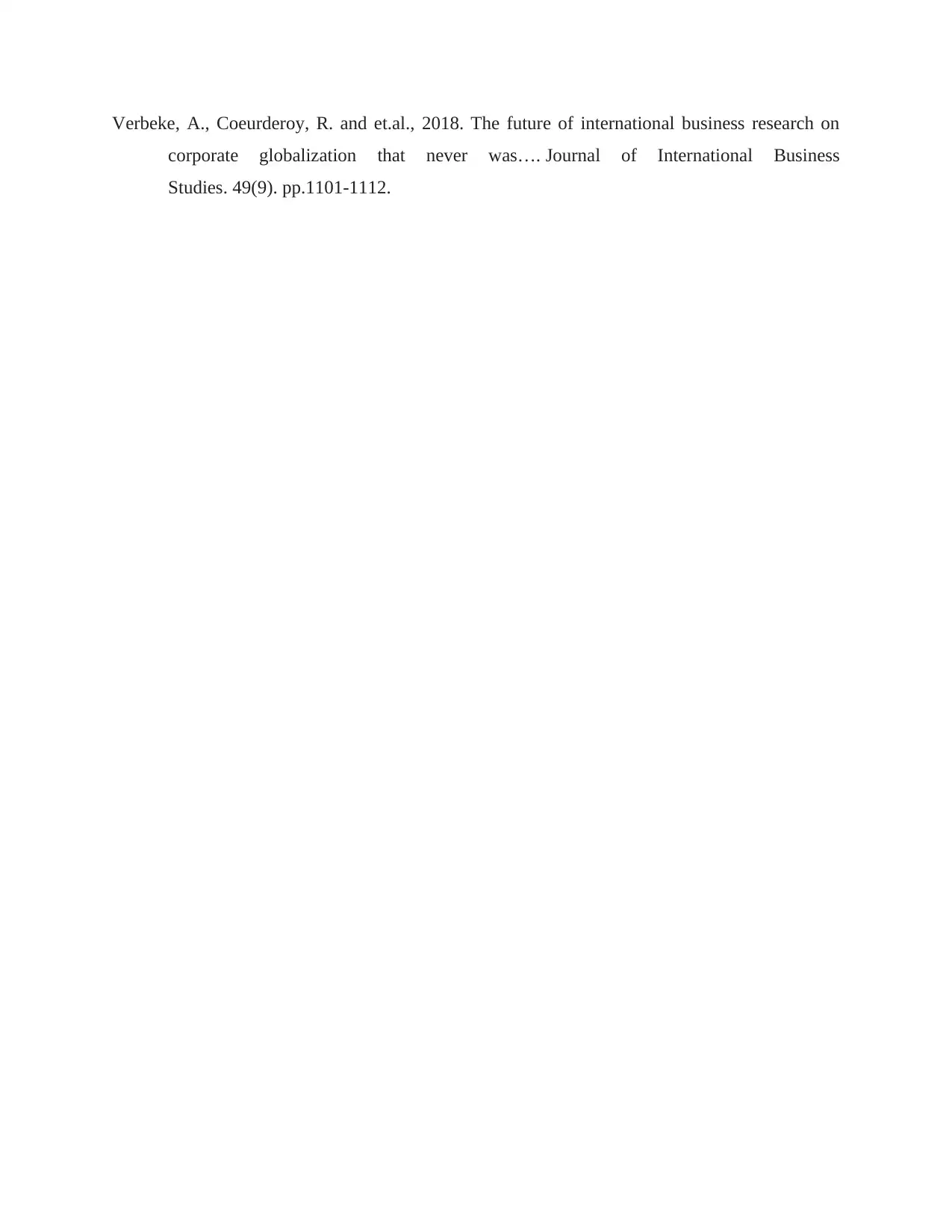
Verbeke, A., Coeurderoy, R. and et.al., 2018. The future of international business research on
corporate globalization that never was…. Journal of International Business
Studies. 49(9). pp.1101-1112.
corporate globalization that never was…. Journal of International Business
Studies. 49(9). pp.1101-1112.
1 out of 10
Related Documents
Your All-in-One AI-Powered Toolkit for Academic Success.
+13062052269
info@desklib.com
Available 24*7 on WhatsApp / Email
![[object Object]](/_next/static/media/star-bottom.7253800d.svg)
Unlock your academic potential
Copyright © 2020–2026 A2Z Services. All Rights Reserved. Developed and managed by ZUCOL.





